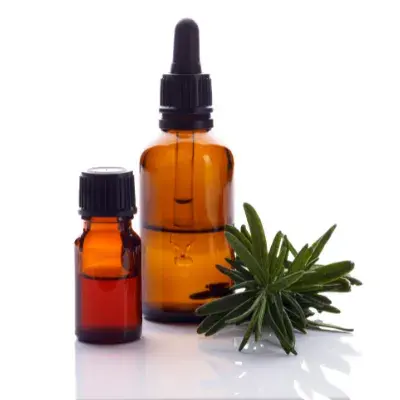Several scientific studies have indicated that rosemary’s Carnosic acid regenerated hair follicles in the scalp and helped restore hair growth.
People have used rosemary oil for centuries to help their hair grow faster and remain healthy. Applying rosemary oil to your hair can provide a number of benefits, but if done improperly, it may cause more harm than good.
We analyzed numerous research papers and consulted with dermatologists and hair care experts to determine the optimal method for applying rosemary oil to your hair.
In the following sections, we will go more into the technique and the science behind it.
Table of Contents
What does Science say of Rosemary Oil’s Benefits on Hair?

According to a 2013 study, essential oils like rosemary oil and peppermint oil help prevent hair loss and stimulate hair growth. Researchers have already determined that rosemary oils hydrate and soothe the scalp, hence promoting the growth of beautiful, healthy hair.
In two further trials conducted between 2010 and 2011, rosemary was associated with hair growth. Those with alopecia who took rosemary oil had a high percentage of hair regrowth, according to the findings of the study.
A 2016 study involving mice and rosemary oil, increased blood flow to the scalp and delivered the necessary nutrients and oxygen to stimulate hair growth.
In studies comparing the effectiveness of rosemary oil and minoxidil in promoting hair growth in people with androgenetic alopecia, rosemary was found to be just as beneficial as minoxidil. It has therefore been demonstrated to be effective on both men and women.
Due to the presence of 5-alpha reductase inhibitors, rosemary is capable of inhibiting DHT formation. The androgen hormone dihydrotestosterone causes hair follicles to cease production in certain men and women.
It has been demonstrated that rosemary essential oil is as effective as minoxidil. It was more effective than minoxidil at relieving the itching scalp side effect during the operation.
Although rosemary extract or essential oil increases hair growth, it is still unclear to scientists how it works, and the specific mechanisms are unknown. However, it is one of the most promising drugs for preventing hair loss, therefore it is worth a try.
How to Apply Rosemary Oil to Hair in 6 Steps: As per Science
Because rosemary oil is so concentrated, it can be helpful even in little amounts. Essential oils like rosemary oil must be blended with a carrier oil such as olive, jojoba, or grapeseed.
Applying rosemary oil to the hair’s surface, according to experts, would do no good and will merely make the scalp oily. You must know how to properly oil your hair if you want to get the most out of it.
In the sections that follow, we’ll go into the technique and the research that went into it in greater depth.
Step 1: Prepare your Hair
We’ll untangle and remove any knots from the hair with a wide-toothed comb. By doing this, hair damage is reduced when rosemary oil is used. This also ensures that the oil is evenly administered and dispersed throughout the scalp and hair.
To straighten your hair from top to bottom, straighten each section from roots to ends.
Step 2: Prepare the Rosemary Oil

The molecules in rosemary oil are substantially larger than hair follicles on the scalp due to the manufacturing process. As a result, rosemary oil cannot reach the hair follicle and have the desired impact at room temperature.
Warming rosemary oil solves the problem by breaking up the oil molecules and making it easier for the oil to penetrate the scalp and hair. The medicinal effects of heated rosemary oil are enhanced. This is good for colored or damaged hair. The hair’s cuticle is sealed by heat, helping it to retain moisture.
Mix around 3–4 teaspoons carrier oil with 7 drops of rosemary essential oils
Note
Rosemary Essential oils must be diluted due to their high concentration.
Heat the oil mixture in a microwave-safe dish (a glass bowl is recommended). Apply a patch test to your hand to make sure the rosemary oil isn’t too hot and that you won’t have an allergic reaction.
Step 3: Apply the Rosemary Oil
We’ll start with the scalp, then the crown, and eventually the rest of the hair using rosemary oil. Massage your scalp in a circular motion with your fingertips to promote hair growth. Give your scalp a thorough massage with your fingertips before applying oil to your hair.
It’s best to use rosemary oil with caution. More frequent hair washing is required when there is too much oil, which negates the benefits of oiling. Shampooing too much strips hair of its natural oils and nutrients, making it brittle, lifeless, and dull.
Step 4: Get Rid of Knots
The wide-toothed comb will be used once more to untangle any knots that may have formed during the oil application. This allows the rosemary oil to reach previously unreachable areas of the head, reducing the risk of hair breakage while washing.
When combing your hair after a massage, be careful because the massage has loosened the cortex and roots, making them more vulnerable to harm.
Step 5: Cover your Head
We must cover our heads with a shower cap or a cotton T-shirt for the next 15 to 20 minutes. This will provide you with a warming sensation while also opening the pores on your scalp and cuticles. The rosemary oil will penetrate your scalp and hair follicles more effectively if you do this.
Note: Because towels are rough, you should not wrap them around your head, as the friction could cause hair damage.
Step 6: Wash Off the Rosemary Oil
A mild shampoo and lukewarm water rinse to complete the oiling process. To open pores and eliminate extra oil and debris, wash your hair with lukewarm water.
To close the freshly opened pores and retain moisture, we must now wash our hair with cold water.
How to Choose the Best Carrier Oil for Rosemary Oil?
There are so many carrier oils on the market that it might be overwhelming. Choose a carrier oil that is one hundred percent pure for the finest effects. The use of pure carrier oil protects the chemical composition of rosemary oil and ensures its solubility. Otherwise, the carrier oil may interfere with the intended effects or the benefits of the rosemary oil.
Avoid carrier oils such as petroleum jelly, vegetable oils, and butter, as they do not penetrate the scalp and hair sufficiently to absorb the active component.
To simplify the process of selecting a carrier oil, we have developed a comprehensive list and categorized it to meet your specific requirements.
| Damaged Hair | Dry Hair | Oily Hair |
|---|---|---|
| Sweet Almond Oil | Pumpkin Seed Oil | Grapeseed Oil |
| Avocado Oil | Evening Primrose Oil | Apricot Kernel Oil |
| Coconut Oil | Castor Oil | Jojoba Oil |
| Pumpkin Seed Oil | Moringa Oil | Argan Oil |
Pro-Tip
Nut-allergic individuals should avoid using oils made from tree nuts, since they may provoke an allergic reaction. Oils derived from apricot kernels, argan, and almonds all belong to this category.
How to Dilute Rosemary Oil for Hair and Scalp?
You only require a few drops of rosemary oil. Avoid applying rosemary oil directly to the scalp, as it may irritate the skin and cause an allergic reaction. Follow the instructions on the label regarding oil dilution.
Test a small quantity of the oil on your scalp or skin to detect whether you have a reaction if you are allergic to plants.
Dilution Proportions:
- For 10% dilution, you need to mix 5 teaspoons of carrier oil with 50 drops of rosemary oil.
- For 5% dilution, you need to mix 5 teaspoons of carrier oil with 25 drops of rosemary oil.
- For 3% dilution, you need to mix 5 teaspoons of carrier oil with 15 drops of rosemary oil.
- For 2.5% dilution, you need to mix 5 teaspoons of carrier oil with 4 drops of rosemary oil.
How to Choose the Best Rosemary Oil?
All of the previously mentioned studies and research indicate that rosemary oil may be beneficial for hair health. However, none of these benefits will be obtained if the rosemary oil is of poor quality. Consider the following when seeking the most effective rosemary oil for hair:
- Ensure that the rosemary oil is suitable for cosmetic applications. Typically, this information is printed on the back of the container.
- Ensure that the bottle of rosemary oil is always made of glass and is dark in color. By blocking light, the bottle’s black color prevents the rosemary oil from degrading.
- Rosemary oil must always be unadulterated and 100 percent pure. Unrefined rosemary oil is designated as “virgin” on the label.
- Use a well-known brand wherever possible.
How to Use Rosemary Oil to Promote Hair Growth, Increase Density, and Prevent Hair Loss

A number of people have found success using rosemary as an aid to hair growth.
Both scientific evidence and personal experience firmly support the claim that rosemary essential oil can help prevent hair loss.
One study found that the rosemary plant’s active component, carnosic acid, repaired tissue and nerve damage. For example, the ability to regenerate nerve cells may also restore hair follicles on the scalp.
Rosemary essential oil is a simple cure that can be used at home, and it may even be comparable to commercial products. In addition, when taken appropriately, it is quite safe and produces few negative effects.
To use rosemary oil to stimulate hair growth and thickness, you only need to apply it to your scalp. Because the growth factor is controlled by each hair shaft beneath the scalp, you do not need to apply oil to your hair in this situation.
- Warm two to three teaspoons of rosemary oil in conjunction with coconut, castor, or olive oil.
- Use your fingers and circular motions to apply the rosemary oil combination to the scalp.
- Cover the area for 15 to 20 minutes with a shower cap or T-shirt.
- Use lukewarm water and gentle shampoo to gently rinse it away.
- Use cold water to rinse the pores to seal them.
Do you know that Rosemary oil can work on Male pattern baldness? Check this detailed article on Rosemary Oil for Male Pattern Baldness (Science)
There are few other scientific oils that can increase your hair growth and thickness. Check this article on Best Scientifically Proven Oils for Hair Growth & Thickness
What to mix with Rosemary Oil for hair growth?
Castor oil is the ideal oil to use with rosemary oil to stimulate hair development, according to a study. This is because castor oil contains a high proportion of ricinoleic acid. Every month, the average person’s hair grows 0.5-0.17 millimeters.
Castor oil has been demonstrated to stimulate faster hair growth. As is typical, heat the mixture of rosemary oil and castor oil to allow it to reach the hair shaft more deeply.
How to use Rosemary Oil as a conditioner?
Rosemary Oil has multiple-use, including as a hair conditioner. When used as a hair conditioner, rosemary oil makes hair smooth, supple and detangled.
- Massage the mixture into your hair and scalp.
- To completely cover your head and hair, rub your fingertips through them.
- For 15 to 20 minutes, wear a shower hat or T-shirt over your hair.
- To keep some of the rosemary oil in your hair, you should rinse it with normal water.
Risks of using Rosemary Oil for Hair

Before using the oil, rosemary-allergic individuals should seek medical advice. Even when not ingested, rosemary oil can cause harm. Before using rosemary oil on hair for the first time, a patch test should be performed.
If rosemary oil causes skin redness or irritation, discontinue use and try another oil.
Avoid getting any rosemary essential oils in your eyes or nose. Immediately rinse your eyes with cold water if this occurs by accident.
Avoid during pregnancy and breastfeeding: Women who are pregnant or nursing should avoid using rosemary essential oil due to a lack of knowledge. The essential oil for hair loss can be applied topically, but its effects are not well understood and should be used with caution.
FAQ
When should we apply rosemary oil on hair? Wet or dry hair?
Rosemary Oil should only be applied to dry hair. Ensure that you have at least one hour before beginning. As the molecules of rosemary oil are larger than the pores on your scalp, they require at least one hour to penetrate.
Wet hair should not be treated with rosemary oil because the water in the hair shaft and the pores on the scalp hinder the oil molecules from penetrating the hair.
Can we apply rosemary oil directly to hair?
Rosemary oil is very concentrated and powerful, even in small amounts. Therefore, rosemary essential oils must be combined with a carrier oil, such as olive, jojoba, or grapeseed oil.
It simply takes a few drops of rosemary essential oil to obtain the desired effect. Using rosemary essential oils directly can irritate your scalp, so exercise caution. Always dilute rosemary oil per the instructions on the package, and never exceed the recommended amounts.
How long should you leave rosemary oil in your hair?
Experts and studies indicate that rosemary oil should be applied to the hair at least two hours before washing. Depending on the desired hairstyle and hair type, the actual time necessary will vary.
Due to its potency, Rosemary Oil should not be used for more than ten hours at a time. A prolonged application of rosemary oil to the scalp may cause irritation, dryness, and pore-clogging.
To know more, check the detailed article on How Long Should You Leave Rosemary Oil in Your Hair
Can you put rosemary oil in your hair everyday? How often should you apply rosemary oil to your hair?
Only if your hair is dry should you apply rosemary oil daily. According to experts, rosemary oil should be used on oily hair once each week. The product may be used up to twice a week on normal hair.
Is too much rosemary oil bad for hair?
Yes, excessive rosemary oil can be detrimental to hair because it necessitates more frequent shampooing. As you likely know, excessive hair washing removes the hair’s natural oils and dries out the scalp and hair. This negates the benefits of adding oil to the hair and may cause more damage.
Too much rosemary oil applied to the scalp may cause clogged pores and hair loss.
Can you sleep with rosemary oil in your hair? Can I leave rosemary oil overnight?
With rosemary oil in your hair, you can sleep for up to eight hours. Wash it out immediately upon awakening. Over eight hours, rosemary oil can clog hair follicles and cause irritation and inflammation. If you keep rosemary oil on your hair for too long, it may collect dust and inhibit hair development.

Creative, versatile, and passionate about her craft, Rupa Das is a well-recognized name in the world of fashion and makeup! This is a woman who has been in the fashion and makeup industry for 24 years and is still one of the leading international makeup artist in the circuit! She has worked in big brands like Lakme, Green Trends, Colors and transitioned to become a Beauty (Hair & Skin) Trainer.